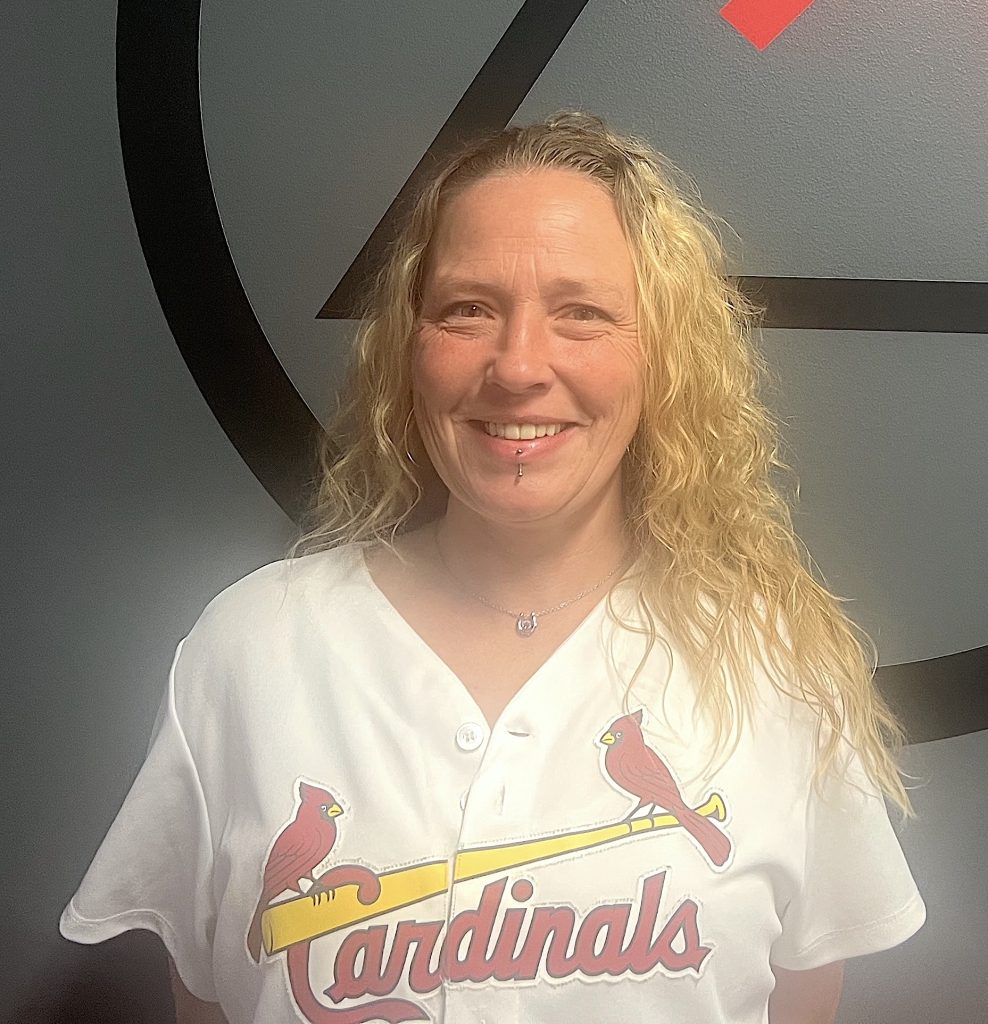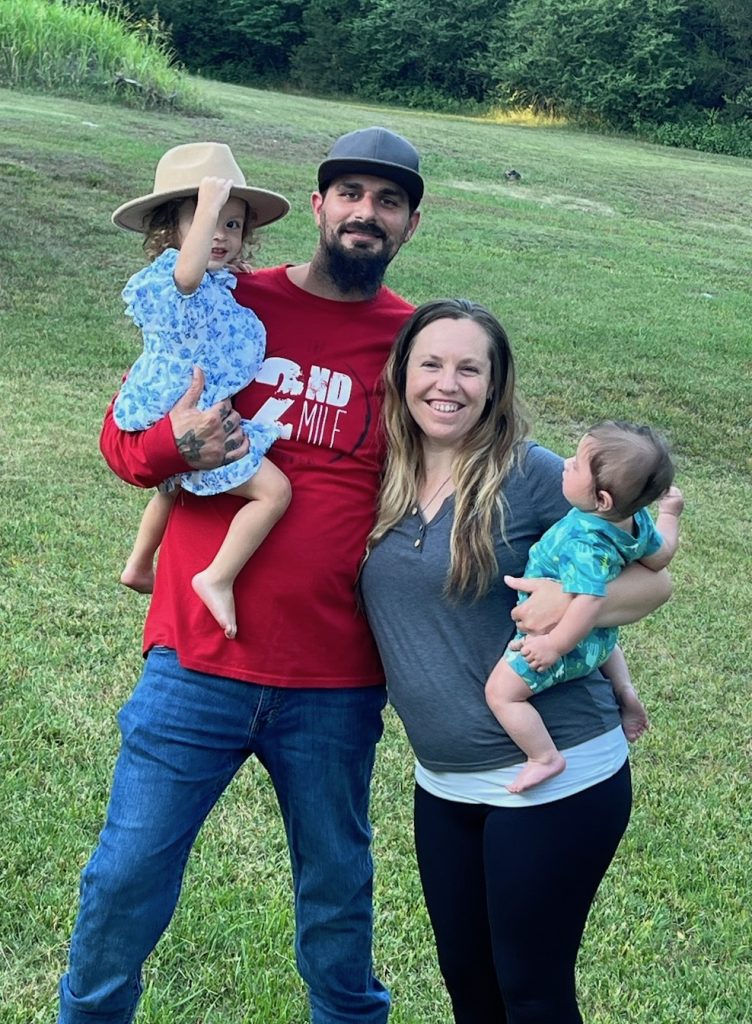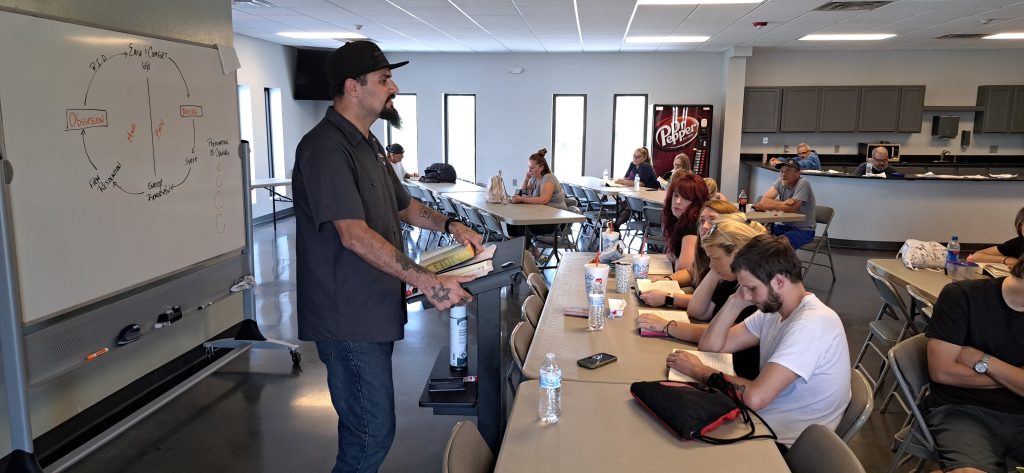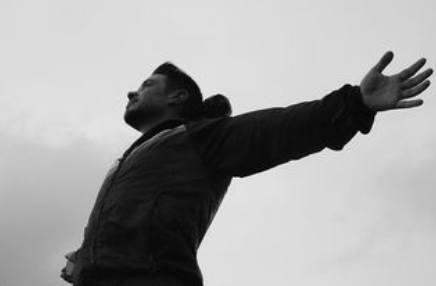Caren Barnes Speaks about Recovery, Christmas, and a Little Box Turtle
Meet Caren Barnes! Commencing CORE’s one-year recovery program just this past March, Caren manages our 6th Street House for women and also is a member of our Second Mile benevolent group. Her testimony for us was dense with information about her addiction, recovery, and hopes for the future. So, we’ll get straight to the point and write about parts of her testimony that maybe we shouldn’t, i.e., the top secret stuff about CORE! We can’t sit on this (looking both ways) so here goes . . .

Ever wonder how certain things happen at CORE? Not the regular stuff, but like, the BIG events? CORE’s annual Christmas event, for example? This is a truly monumental undertaking. But who actually does this stuff? How do they do it? What actually happens behind the scenes?
We had no idea how to answer these questions until Caren walked through our door. While we exchanged the usual pleasantries, CORE’s Operations Manager Gary Osborn peeked into the office, said hello, and thanked Caren for all of her hard work. That sure got our attention. What work? It turns out that she and her teams of volunteers – in the middle of summer – have been preparing for Christmas all along!
Every year, CORE sets up a gigantic holiday store where people find toys and household items to last throughout the whole year. It’s all free, and last year’s event was so big that it took four classrooms, a central foyer, and a long hallway at the Hollister School District just to hold everything. Everything was beautifully organized by item and category, too. This year may be even bigger, and the person in charge of organizing this year’s event was sitting right in front of us. As Caren explained:
“The [Branson] warehouse was getting to be kind of a mess. We’d had people every Tuesday picking up donations and putting them there. Little did I know it all had to be separated, marked, and organized. Gary’s like, you know all this has to be organized? He asked if I would take on the project, and I agreed. So the girls from 6th Street, or any other girl who wants to volunteer, have been coming over there. It’s become a huge job. A really huge job.
At first I’d just go over there and play my music and start in. From there, I started having meetings over there where we’d get pizza and stuff. And then people who needed community service started coming over. So now it’s Mondays and Tuesdays, and I make sure everybody gets over there for whatever time they need.”
We always wondered how CORE’s Christmas event happens. Now we know.
For her own part, Caren didn’t notice what CORE was doing last year for this holiday event. She was still a client and “still in myself,” as she puts it. What a difference a year in recovery makes. What’s important to her today is that people in need will get help. “Whatever they need, here it is,” she says, “It’s their Christmas. They don’t have to know who I am, but it’s the best Christmas present I can give to the community. I’m overjoyed to help, and it really warms my heart!”
Caren certainly has a lot to be thankful for today, too, but it wasn’t always so. She lost her husband while she was still in her teens, and then spent twenty years in her addiction. “At one point, my kids got taken away,” she remembers, “It was a big fight. All the money, the court dates. I was eight years on probation and did jail time. My whole life seems like a blur. I can’t tell you how many times I ended up in jail. DUI, meth, crack. I was always caught.”
How bad did things get for her? She was unable to even think about what life might be even if she got clean. She explains, “I was powerless, but at the time I didn’t really know what addiction really was. I’d seen it most of my life. It was the harsh reality of life, normal.” Moreover, a mere eighteen months ago, Caren’s life had become completely unmanageable. To top it off, she was fired from her job because of substance use. A despondent Caren had to walk home because she had lost her driver’s license, too.
Fortunately, every cloud has a silver lining. In this case, losing her job turned out to be the first in a chain of events that brought Caren to CORE. While she was trudging home that day, Caren saw a recovery facility where they also held AA/NA meetings. She’d never been to a recovery meeting before, not ever, but this time she remembers “I was upset and thought, well, I’m going to walk in on this meeting. I need something.” At that very meeting she met the son-in-law of her boss, the one who just fired her. He promised to help get her into a detox, to which she consented. “I went home, packed my bags, and went to detox. I was there for 40 days. And a counselor there kept talking about Branson, Missouri. She said, I have a place I think you should go, it’s called CORE, in Branson. She said, I don’t know why, but I just see that you would do good there.”
Caren had never been to Branson before, but she made the trip with the help of her concerned father. The first thing she remembers was our women’s coordinator, Jen Brinkman, taking her in with open arms. Because she arrived on a Friday, she spent the day at our recovery center and attended our Peace in the Storm worship services that evening. “When I first went to church, I cried when Cary [McKee] was talking,” she remembers, “I knew I truly belonged here. After church, I couldn’t wait to get home and see the house.”
She describes herself as a slow starter in the program itself. Nevertheless, once she saw the truth about who she is apart from recovery, there was no turning back for Caren. She says, “I did pay attention in class, and then the more attention I paid at church and in class, I came to really understand that I’m here for a reason, and that I’m powerless. After that, I’m giving everything I can to my program from here on out. I became a chore coordinator. I’m volunteering. At work I’m a totally different person. I’m giving everything I can.”
This past March, Caren commenced our one-year recovery program. She vows never to forget where she came from, and she credits God for her recovery:
“I feel like my turnaround is because of having God in my life. I hear God now. Not by sound, but by the journey I’m on and which way He wants me to go. Living in what He wants me to do. I meditate. I reflect back on my days. I do my steps and preach it, walk it, and do everything I can. This is my one shot in life. I can’t see living any other way ever again.”
On April 24th of this year, Caren received a telephone call from Jen asking if she wanted to manage our 6th Street House. “Jen said, we talked about it, and we think you’d be the best fit. She said it’s your house; do what you can to make it a great one. I’ve been there ever since, and I absolutely love it.” To Caren, being a house manager is not having people look up to her. She explains, “I’m helping other girls. I’m the same as them, and I’m going to treat them the way I want to be treated. That’s what I do at 6th Street. We’re all the same. Everybody feels like they can open up, and we’re all really close here.”
As a supplement to her new role, Caren is determined to put her gardening skills to use. “I did take crop science and love gardening,” she says, “I’ve always pictured myself in a truck with a bed full of flowers and stuff that I’m doing.” By the happiest of circumstances, she’s not only eligible to get her license back, but she also was working on it the very day we spoke. We hope Caren gets her truck soon.
Our interview with Caren then brought yet another unexpected bonus. She told us stories about a box turtle living in the yard at 6th Street House. We listened intently, and we wondered – is there a children’s book in these stories, perhaps? The off chance that Caren may become a famous author someday makes us hesitant to retell these valuable stories here. It suffices to say that the box turtle is busy at 6th Street House and is enjoying many turtle adventures there.
On the family front, Caren excitedly described how she maintains close contact with loved ones. “My main amends were to my children. Raising them, they knew I wanted them to finish school. They’d seen some of my caring nature. I fed them every night. But they didn’t really know me. Now, I talk to them almost every day. Of course, they forgave me before I even made amends. And I’m a grandma now. I do talk to her [i.e., her granddaughter] every day. We Facetime. She points at me through the phone.” Caren also reports being in good standing with her siblings (“they’re proud of me”) and suddenly offers “My dad called me just yesterday, too, which he’s never really just called me out of the blue.”
So, what’s in Caren’s future? For one, she loves her job here in Branson and plans to be there for awhile. She started the job in the first week she got here, and further reports, “It’s great to be working and being in the best health I’ve ever been, and to be at peace. Money can’t buy what I feel right now. I feel richer now than I’ve ever been in my entire adult life.” Hearing this, we naturally are very pleased for Caren. But what about CORE? And the turtle?
Happily for all, as a member of our Second Mile group, Caren will be here for at least another year. She still feels new to recovery and wants to give herself time to learn what she likes and doesn’t like, and about self-care and loving herself more. Also, she says confidently, “as a house manager, I feel like I’ve more to give. I’m not done helping. I still feel like I’ve got a lot to do here.”




